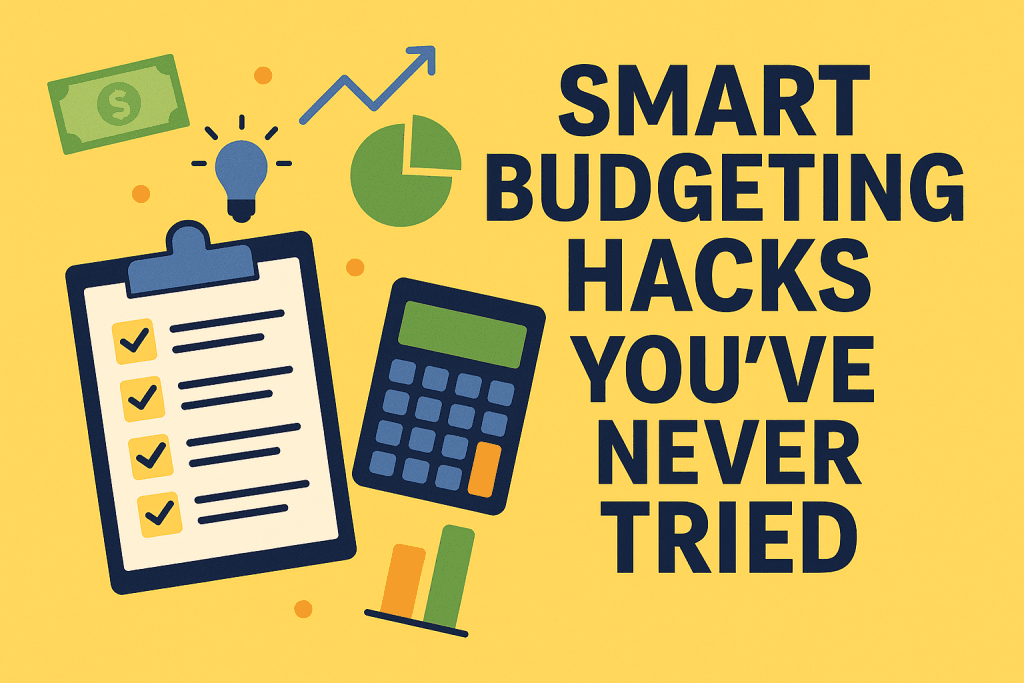Smart Budgeting Hacks You’ve Never Tried – Managing money effectively requires creativity, discipline, and adaptability. Most budgeting advice focuses on the basics—track your expenses, save more than you spend, and avoid unnecessary debt. While these are essential principles, there are lesser-known techniques that can elevate your financial strategy. This guide explores Smart Budgeting Hacks You’ve Never Tried, giving you actionable ideas to refine your approach and gain more control over your finances.
See moer: How to Create a Monthly Budget That Works
Smart Budgeting Hacks You’ve Never Tried – Why Traditional Budgeting Isn’t Always Enough
Budgeting is fundamental to personal finance, but relying solely on conventional methods can lead to stagnation. While standard frameworks like the 50-30-20 rule work well for many, not everyone benefits from rigid formulas. Some individuals need flexible and innovative methods that adjust to their lifestyle and income dynamics.
By focusing on Smart Budgeting Hacks You’ve Never Tried, this article addresses creative and underutilized strategies for spending control and savings growth.
Traditional budgeting often lacks personalization. These fresh techniques add a layer of intelligence to your money management system and help develop adaptive financial habits.

Hack 1: Automate Budgets Using Calendar-Based Planning
Instead of budgeting monthly by default, try aligning your budget with your income frequency and major recurring bills. Calendar-based budgeting helps match your cash flow to due dates, preventing overdrafts and missed payments.
Using smart budgeting calendars ensures that each paycheck covers a specific set of expenses. This method increases visibility and avoids end-of-month stress. It’s one of the Smart Budgeting Hacks You’ve Never Tried but can easily implement with mobile calendars and alerts.
Combining digital reminders with financial routines supports timely expense forecasting and minimizes bill-related anxiety.
Hack 2: Rename Budget Categories to Match Personal Values
Changing the way you label categories in your budget can change how you interact with them. Instead of generic names like “Entertainment,” use custom labels such as “Joyful Experiences” or “Stress Relief.” This triggers mindfulness and helps you reflect on the emotional impact of spending.
This hack from the list of Smart Budgeting Hacks You’ve Never Tried taps into behavioral finance by shifting the perception of money from transactional to intentional.
Creative budgeting names build emotional financial awareness, which can lead to more thoughtful consumption.
Hack 3: Use the 80 Percent Rule Instead of the 100 Percent Plan
Rather than allocating every dollar you earn, plan your budget based on 80% of your income and keep the remaining 20% unassigned. This buffer reduces the impact of impulse spending or unexpected costs.
Many people discover this technique only after budget burnout. However, among the Smart Budgeting Hacks You’ve Never Tried, this approach creates breathing room without compromising structure.
Applying the 80 percent principle supports built-in budgeting flexibility.
Hack 4: Weekly Microbudgets for Variable Spending
Divide your monthly discretionary spending into weekly segments. Rather than allocating a large monthly amount for food or entertainment, set a smaller weekly limit. This helps reduce overspending early in the month.
This trick makes it easier to recover from a high-spend week without derailing the full month’s finances. As one of the more practical Smart Budgeting Hacks You’ve Never Tried, it enhances control and improves tracking.
Weekly budgeting encourages short-term financial discipline and better cash flow monitoring.
Hack 5: Zero-Out Your Checking Account
At the end of each week or pay period, transfer any remaining funds in your checking account to savings. This technique ensures you don’t subconsciously spend whatever is left just because it’s there.
Adopting this habit promotes consistent savings growth and falls under the category of Smart Budgeting Hacks You’ve Never Tried that use psychological triggers effectively.
This system builds a reliable savings automation rhythm.

Hack 6: Create a “No Spend” Category in Your Budget
Instead of just setting spending limits, include a “No Spend” category to track days when you intentionally don’t buy anything. Reward yourself when you hit a streak.
This gamifies the budgeting process and fosters greater spending awareness. As one of the Smart Budgeting Hacks You’ve Never Tried, it’s effective for breaking consumption habits and reinforcing mindful behavior.
Incorporating non-spending metrics fosters a behavior-focused savings culture.
Hack 7: Match Discretionary Spending with Equal Savings
Whenever you spend on something discretionary, match that amount with a savings contribution. For example, if you spend $30 on dining out, move $30 to your savings account.
It makes each expense a conscious tradeoff and forces you to evaluate if the purchase is worth double its cost. This strategy is one of the most powerful Smart Budgeting Hacks You’ve Never Tried for building savings fast.
This approach supports a value-based spending counterbalance.
Hack 8: Budget by Emotion Using a “Feel-Good Index”
List recent purchases and rate them based on how much joy they provided over time. High-cost items with low joy ratings should be eliminated in future budgets. Replace them with low-cost, high-joy items.
This is one of the lesser-known Smart Budgeting Hacks You’ve Never Tried, but it links psychology with financial planning and helps people break emotional spending patterns.
Applying this index enhances your personal satisfaction-to-cost ratio.
Hack 9: Use a “Level Up” Fund for Income Increases
When your income rises, avoid the trap of lifestyle inflation by directing that increase to a specific “Level Up” fund. This fund can be used for long-term goals, business investments, or future self-rewards.
This technique reframes raises as strategic tools rather than excuses to spend more. It’s an intelligent inclusion in the toolkit of Smart Budgeting Hacks You’ve Never Tried.
This strategy encourages future-focused income allocation.
Hack 10: Build Sinking Funds with Themed Saving Buckets
Sinking funds are mini savings accounts for known, irregular expenses like car repairs, holidays, or annual bills. Instead of keeping one large savings pool, divide it into labeled buckets for each purpose.
This technique brings clarity to saving and avoids drawing from your emergency fund for planned expenses. It’s one of the most widely applicable Smart Budgeting Hacks You’ve Never Tried for long-term financial planning.
Themed sinking funds enable event-specific financial preparedness.
Hack 11: Introduce a “Lag Month” Buffer
Build a buffer that allows you to live on last month’s income. It removes the stress of paycheck-to-paycheck living and simplifies the budgeting process.
Though challenging at first, once established, this system offers peace of mind and better decision-making. It stands out as a transformational idea in the list of Smart Budgeting Hacks You’ve Never Tried.
A lag month buffer supports income smoothing and proactive planning.
Hack 12: Budget with Percentages Instead of Amounts
Instead of budgeting in fixed dollar amounts, use percentages for variable categories. This works well when your income fluctuates.
If groceries are set to 10% of income, you always spend within your means regardless of earnings. This approach is ideal for freelancers or anyone with irregular pay and fits within Smart Budgeting Hacks You’ve Never Tried for adaptive planning.
Percentage-based budgeting offers income-proportional financial scaling.
Hack 13: Use Voice Notes to Reflect on Spending Decisions
After each non-essential purchase, record a short voice note about why you made the decision and how it made you feel. Reviewing these later can reveal emotional triggers and spending patterns.
This self-reflection technique is one of the most behavioral Smart Budgeting Hacks You’ve Never Tried and promotes emotional accountability.
Voice journaling builds a personal spending insight archive.
Hack 14: Audit Your Budget with the “Three R’s” Method
Every month, ask yourself: What should I Reduce? What can I Remove? What needs to be Rebalanced?
This framework creates a habit of auditing your budget with intention, rather than just tracking it passively. Among Smart Budgeting Hacks You’ve Never Tried, it enhances efficiency and goal alignment.
The Three R’s reinforce a continuous financial improvement cycle.
Hack 15: Add a “Disaster Prep” Line to Your Budget
Disaster preparedness includes small expenses like fire extinguishers, backup chargers, or emergency kits. These items are often overlooked but become critical during emergencies.
Allocating funds monthly reduces risk and adds peace of mind. As a proactive part of Smart Budgeting Hacks You’ve Never Tried, this ensures holistic planning.
Building this category reflects resilient household budgeting.
Hack 16: Track Budget “Leaks” Instead of Just Expenses
Instead of logging every purchase, try listing every dollar that was poorly spent or failed to provide value. This reframing helps you focus on what to avoid, not just what to track.
One of the smartest psychological Smart Budgeting Hacks You’ve Never Tried, it shifts the mindset from control to reflection.
Leak tracking offers a negative filter budgeting method.
Hack 17: Hold a Monthly Money Retrospective
Conduct a 30-minute self-check where you reflect on financial decisions, budget adherence, and emotional patterns. Use journaling prompts or spreadsheets to structure the session.
This hack turns budgeting into a habit of learning and growth. Among Smart Budgeting Hacks You’ve Never Tried, it promotes self-awareness and incremental change.
A monthly retrospective builds a habitual financial feedback loop.
Hack 18: Use Reverse Budgeting for Savings First
Instead of spending first and saving what’s left, set aside a percentage of your income for savings as soon as you’re paid. The rest is what you’re allowed to spend.
Reverse budgeting is powerful for wealth accumulation and is a cornerstone of effective Smart Budgeting Hacks You’ve Never Tried.
This tactic creates a top-down money preservation system.
Hack 19: Add a Regret Tracker to Your Budget Sheet
In your budget document, keep a simple column where you mark purchases you regret. Reviewing these over time helps reduce repetition and avoid guilt-based spending.
Among the more emotional Smart Budgeting Hacks You’ve Never Tried, this improves mindfulness and purchase evaluation.
The regret column enhances your budgeting pattern diagnosis.
Hack 20: Implement a Budget Reset Week Every Quarter
Every three months, take a week to pause discretionary spending, reassess goals, and clean up your financial tools. Think of it like a detox for your wallet.
This refresh supports clarity and renewed motivation. It’s a seasonal trick within Smart Budgeting Hacks You’ve Never Tried to maintain momentum.
The reset week helps realign with a refined financial mission.
Final Thoughts
Smart Budgeting Hacks You’ve Never Tried provide creative, personalized, and data-driven approaches to improving financial management. From psychological tools to structural changes and technology integrations, these hacks support greater control, improved savings, and reduced stress.
Applying even a few of these strategies can yield immediate benefits. They add depth and intention to your budget, making it a flexible and intelligent tool rather than a rigid set of rules.

